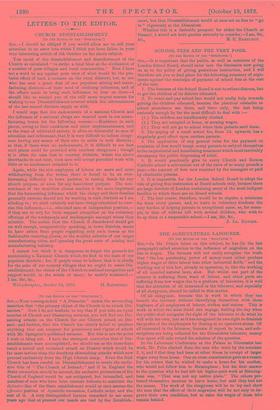SCHOOL FEES AND THE VERY POOR.
[TO TSB EDITOR OF THE"SPECTATOR."]
Sra,—It is important that the public, as well as members of the London School Board, should enter into the discussion now going on as to the policy of giving gratuitous instruction, and I will therefore ask you to find place for the following summary of argu- ments against the remissipa of payment of school fees at the cost of the rate.
1. The business of the School Board is not to relieve distress, but to get the children of its district educated.
2. To remit and pay school fees would not really help towards. gettingthe children educated, because the practical obstacles to school attendance are three, and three only, the last being curiously enough by far the most difficult to deal with :- (1.) The children are insufficiently clothed.
(2.) They are occupied at home, or earning wages.
(3.) They will not go to school when their parents send them.
3. The paying of a small school fee, from id. upwards, has a singularly good effect upon careless parents.- 4. The application of any general rules for the payment or remission of fees would tempt many parents to subject themselves to the inquisitorial and humiliating treatment which must inevitably accompany the public dispensing of relief.
5. It would practically give to every Church and Roman Catholic school a subvention out of the rates of so many pounds a year,—the amount of fees now remitted by the managers or paid by charitable persons.
6. It is impossible for the London School Board to adopt the rule of giving free instruction at Board schools only, because there are large districts of London containing many of the most indigent families in which there are no Board schools.
7. The best course, therefore, would be to require a minimum fee from every parent, and to leave to voluntary kindness the- easy burden of helping parents in exceptional cam, as, for exam- ple, in that of widows left with several children, who wish to- ke ep them at a respectable school.—I am, Sir, &c.,
J. LL. DAVIES.


































 Previous page
Previous page